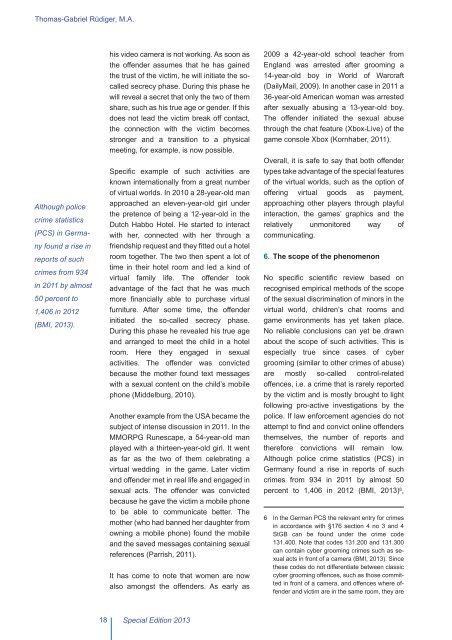ora-schriften-s-2013
ora-schriften-s-2013
ora-schriften-s-2013
Create successful ePaper yourself
Turn your PDF publications into a flip-book with our unique Google optimized e-Paper software.
Thomas-Gabriel Rüdiger, M.A.<br />
Although police<br />
crime statistics<br />
(PCS) in Germany<br />
found a rise in<br />
reports of such<br />
crimes from 934<br />
in 2011 by almost<br />
50 percent to<br />
1,406 in 2012<br />
(BMI, <strong>2013</strong>).<br />
his video camera is not working. As soon as<br />
the offender assumes that he has gained<br />
the trust of the victim, he will initiate the socalled<br />
secrecy phase. During this phase he<br />
will reveal a secret that only the two of them<br />
share, such as his true age or gender. If this<br />
does not lead the victim break off contact,<br />
the connection with the victim becomes<br />
stronger and a transition to a physical<br />
meeting, for example, is now possible.<br />
Specific example of such activities are<br />
known internationally from a great number<br />
of virtual worlds. In 2010 a 28-year-old man<br />
approached an eleven-year-old girl under<br />
the pretence of being a 12-year-old in the<br />
Dutch Habbo Hotel. He started to interact<br />
with her, connected with her through a<br />
friendship request and they fitted out a hotel<br />
room together. The two then spent a lot of<br />
time in their hotel room and led a kind of<br />
virtual family life. The offender took<br />
advantage of the fact that he was much<br />
more financially able to purchase virtual<br />
furniture. After some time, the offender<br />
initiated the so-called secrecy phase.<br />
During this phase he revealed his true age<br />
and arranged to meet the child in a hotel<br />
room. Here they engaged in sexual<br />
activities. The offender was convicted<br />
because the mother found text messages<br />
with a sexual content on the child’s mobile<br />
phone (Middelburg, 2010).<br />
Another example from the USA became the<br />
subject of intense discussion in 2011. In the<br />
MMORPG Runescape, a 54-year-old man<br />
played with a thirteen-year-old girl. It went<br />
as far as the two of them celebrating a<br />
virtual wedding in the game. Later victim<br />
and offender met in real life and engaged in<br />
sexual acts. The offender was convicted<br />
because he gave the victim a mobile phone<br />
to be able to communicate better. The<br />
mother (who had banned her daughter from<br />
owning a mobile phone) found the mobile<br />
and the saved messages containing sexual<br />
references (Parrish, 2011).<br />
It has come to note that women are now<br />
also amongst the offenders. As early as<br />
2009 a 42-year-old school teacher from<br />
England was arrested after grooming a<br />
14-year-old boy in World of Warcraft<br />
(DailyMail, 2009). In another case in 2011 a<br />
36-year-old American woman was arrested<br />
after sexually abusing a 13-year-old boy.<br />
The offender initiated the sexual abuse<br />
through the chat feature (Xbox-Live) of the<br />
game console Xbox (Kornhaber, 2011).<br />
Overall, it is safe to say that both offender<br />
types take advantage of the special features<br />
of the virtual worlds, such as the option of<br />
offering virtual goods as payment,<br />
approaching other players through playful<br />
interaction, the games’ graphics and the<br />
relatively unmonitored way of<br />
communicating.<br />
6. The scope of the phenomenon<br />
No specific scientific review based on<br />
recognised empirical methods of the scope<br />
of the sexual discrimination of minors in the<br />
virtual world, children’s chat rooms and<br />
game environments has yet taken place.<br />
No reliable conclusions can yet be drawn<br />
about the scope of such activities. This is<br />
especially true since cases of cyber<br />
grooming (similar to other crimes of abuse)<br />
are mostly so-called control-related<br />
offences, i.e. a crime that is rarely reported<br />
by the victim and is mostly brought to light<br />
following pro-active investigations by the<br />
police. If law enforcement agencies do not<br />
attempt to find and convict online offenders<br />
themselves, the number of reports and<br />
therefore convictions will remain low.<br />
Although police crime statistics (PCS) in<br />
Germany found a rise in reports of such<br />
crimes from 934 in 2011 by almost 50<br />
percent to 1,406 in 2012 (BMI, <strong>2013</strong>) 6 ,<br />
6 In the German PCS the relevant entry for crimes<br />
in accordance with §176 section 4 no 3 and 4<br />
StGB can be found under the crime code<br />
131.400. Note that codes 131.200 and 131.300<br />
can contain cyber grooming crimes such as sexual<br />
acts in front of a camera (BMI, <strong>2013</strong>). Since<br />
these codes do not differentiate between classic<br />
cyber grooming offences, such as those committed<br />
in front of a camera, and offences where offender<br />
and victim are in the same room, they are<br />
18 Special Edition <strong>2013</strong>





